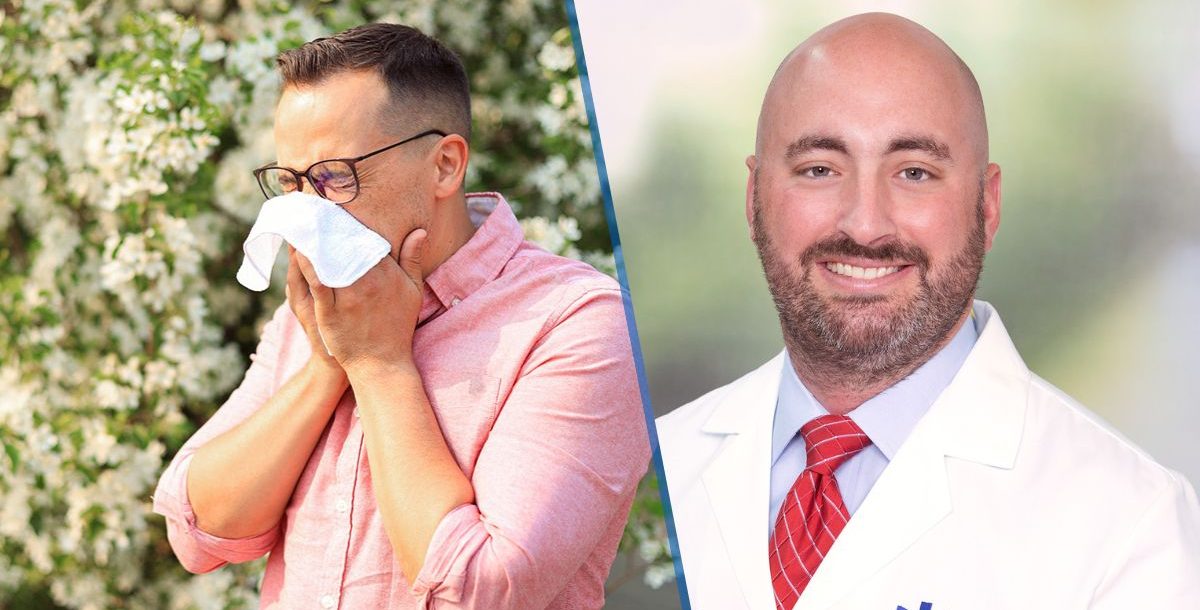You feel it coming on – the headache, the runny nose, sneezing. It’s your annual cold. You get one at the same time every year. However, what if it isn’t a cold but seasonal allergies? Taking a closer look at the symptoms you’re experiencing can help you settle the allergies vs. cold debate.
Allergies vs. cold
Seasonal allergies and the common cold share many of the same symptoms. This can make it hard to identify what you’re actually suffering from. However, knowing what’s ailing you is important so you can treat it effectively.
Allergies
Many people contract colds at roughly the same time each year. However, if they come on suddenly, you may want to talk to your doctor about the possibility of seasonal allergies.
Your stuffy, runny nose may not tell you the answer, but rather how long you have it and what you’re congested with. Allergies can last longer than a cold, and mucus is usually thin and watery. Congestion is commonly accompanied by sneezing and itchy eyes, the latter of which is usually a tell-tale sign you don’t have a cold.
Common colds
Unlike allergies, the common cold is caused by a virus, and your body has to fight off the virus before your illness goes away. Usually, a cold lasts about seven to 10 days and can include thick mucus, sore throat and coughing. While less common, one way to know for sure that what you have isn’t allergies is a fever – the inflammation caused by a cold can lead to elevated body temperature or a fever.
How do you know if it’s allergies or a cold?
Many of the symptoms of both allergies and colds are similar. Some are less common depending on what you have:
| Symptom | Allergies | Cold |
| Fever | Never | Sometimes |
| Fatigue or tiredness | Sometimes | Sometimes |
| Sneezing | Common | Common |
| Itchy eyes | Common | Uncommon |
| Sore throat | Uncommon | Common |
| Nasal congestion | Common | Common |
| Runny nose | Common | Common |
| Body aches and pains | Never | Sometimes |
| Cough | Sometimes | Common |
However, other factors might help you identify your illness. Timing, duration and intensity tend to vary between colds and allergies. If symptoms usually feel about the same for as long as you have them, you can probably assume it’s allergy-related as opposed to a cold, which commonly starts off feeling intense and then tapers as your body fights the virus that caused it.
Colds tend to last about seven to 10 days before clearing up, but allergies can last as long as their trigger remains.
“When trying to differentiate between the common cold and allergic symptoms, allergies typically involve more itching of the eyes or nose, and your symptoms can persist as long as the allergen is present, whereas the common cold symptoms will resolve within a week,” says Brady S. Christensen, DO, a family medicine physician in our Hampton Roads market.
How to treat allergies vs. a cold
Once you know whether you have allergies or a cold, then it’s time to determine what treatment you need. In both cases, medicine won’t treat the ailment itself but will rather treat only the symptoms.
Allergies
Until whatever you’re allergic to goes away or airborne levels drop to a manageable level, you’ll likely feel the effects. Start by reducing your exposure to the allergen:
- Spend less time outside
- Avoid tasks that stir up the air around you, such as gardening, lawn mowing or dusting
- Keep windows and doors closed
- Use a dehumidifier
- Vacuum often
If your symptoms are intense enough to warrant allergy medication, there are plenty of over-the-counter treatments you can use, including:
- Oral antihistamines
- Corticosteroid nasal sprays (for short-term use)
- Saline nasal rinsing
- Nasal spray
- Oral decongestants
“Treating allergies often requires a personalized approach,” Dr. Christensen says. “Understanding the individual’s triggers – which often include tree, grass and weed pollen, mold, dander or dust – as well as using a combination of medications and lifestyle modifications leads to relief.”
Colds
Until your body can fight off the virus, you’ll likely feel the effects of a cold. There is no treatment to fight a cold itself, but some can alleviate the intensity of your symptoms or shorten the duration.
Some treatments include:
- Staying hydrated by drinking a lot of water, juice, clear broth or warm lemon water with honey
- Avoiding alcohol, coffee and other caffeinated drinks
- Gargling with salt water to alleviate a sore throat
- Using cough drops or honey to suppress a cough
- Nasal drops and sprays to relieve congestion
- Resting
- Using a humidifier to add moisture to the air
However, sometimes your symptoms need help from medication. Some over-the-counter medicines can help speed up relief, such as decongestants, antihistamines, cough suppressants and pain relievers. Keep in mind that these can have side effects and should not be taken for a long period of time, nor will they shorten the duration or prevent you from getting a cold entirely.
“I like to recommend over-the-counter steroid nasal spray and antihistamines to provide relief from nasal congestion and other symptoms associated with both colds and allergies,” Dr. Christensen adds.
When to call the doctor
When it comes to differentiating allergies vs. colds, you may need to speak with your doctor at some point. Children with allergies or a cold may need to be seen by their pediatrician sooner than adults due to a higher risk of dehydration. Additionally, children can’t take most cold and cough medications, so they may need to be seen in the office for other treatment options.
Allergy symptoms can last for an extended period of time, especially during months when environmental allergens tend to be at higher levels. However, if you experience them often or they seem to hang on for a long time, you may require allergy testing to pinpoint specific allergens and treatment options.
As for colds, if your symptoms don’t improve or get worse after seven to 10 days, it’s time to give the doctor a call. Colds can lead to infections, such as sinus or upper respiratory infections, bronchitis or pneumonia.
Learn more about the primary care and family medicine services we offer at Bon Secours.





